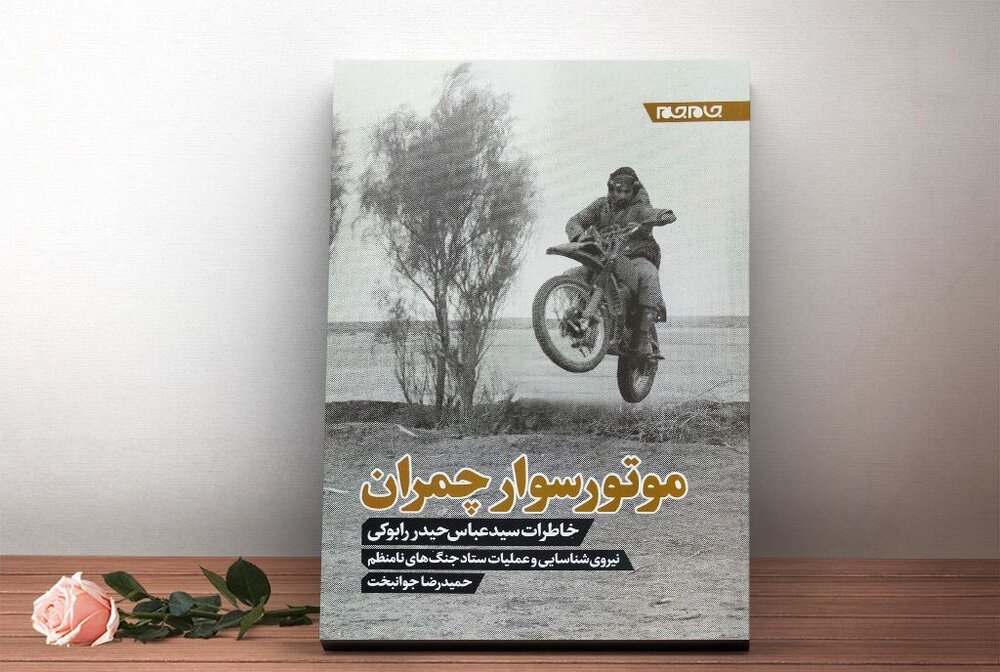The story of a motorcyclist who loved Chamran

Seyyed Abbas Rabuki was a member of the motorcycle riders’ team of martyr Chamran in the center of irregular battles, and his experiences are recounted in the book "Chamran's motorcyclists" by Hamidreza Javanbakht, which was just released by Jam-e Jam publication.
* Please tell us a little bit about yourself. How old are you? Where do you come from? What academic field did you study?
As you know my name is Hamidreza Javanbakht. In 2000, I was born in the southern part of Tehran. I'm the family's first kid, and my brother joined the family ten years after my birth. I was raised in Javadieh, one of Tehran's more well-known southern neighborhoods. When choosing my educational path years ago, I preferred humanities over-engineering and experimental fields since I always pictured doctors and engineers leading boring lives in this gloomy city.
I wanted to explore the world, meet more people, have more experiences, write and read better, and discover societal issues at the society. I am a sociology student today because of this, and maybe for the same reasons, I decided to become a journalist from the start of my career path.
* How did you first become a writer? Have you got any expertise in this area? Who offered you help and support?
My father was my greatest supporter. He has major literary talents like journalism and documentation, and he is a man of culture and the arts. My father gave me The Little Prince when I was very little. For me, reading this book opened up a whole new world of reading and writing.
* Why did you decide to write about the topic of sacred defense and war literature out of all the possible topics?
For a few years now, I've got rather decent research on the history of our eight-year war with Iraq, which has obviously deepened over the last few years. Also, according to many scholars, the eight-year conflict between Iran and Iraq is the most significant conflict of the 20th century, which is likely due to the conflict's cultural and popular aspects.
* How did you relate to the environment of that era, given that you were born in the 20s and did not live through the war?
It may seem weird that, at the age of 22, despite having only heard about the Iran-Iraq War, I chose to read more about it, get more knowledge, and eventually write a book about it. I was born eleven years after the war's end. Mehdi Chamran, Shahid Chamran's brother, was very astonished to meet me on the day of the book release. He thought that someone at least 40 or 50 years of age must be the author of such a lengthy book. The honor of being granted the opportunity to create such a book was something I was considering as I was writing the book. If the opportunity to create a book about martyrs were offered again, I would gladly accept it.
* How did you come across this topic to write a book about it?
Seyed Abbas Rabuki, a young man of 21 years old, is the protagonist of "Chamran's motorcyclists," a story about his life. Seyed Abbas loves motorbikes and riding them, and he only thinks about motorcycles and cinema. He never imagined that one day he would join the war, though. However, on a cold fall day, martyr Chamran immediately enlists him into the Irregular Wars command, and Seyyed Abbas joined a group of Tehrani motorcycle riders in heading to the southern fronts.
The reader will eagerly read the entire book through to the very last page and follow these youngsters to read their humorous and tragic stories. Furthermore, we learn about the Irregular Warfare Headquarters, a very significant and entirely non-governmental organization.
* In your first experience, weren't you terrified to fail?
Every new experience comes with its own set of worries, of course, but it has long been believed that the first time is always the best. However, I tried my best to control it by following my father's advice, using sources and research about the book's subject, and putting my faith in God.
* How did you feel when your book was released?
It was such a great and unforgettable feeling. Especially considering that it was the first book I had ever written, and this is unique to authors, regardless of how many books they produce after that.

Leave a Comment